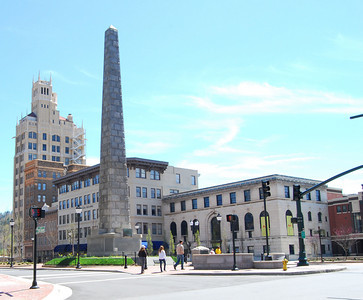A Republican lawmaker purporting to be acting out of budgetary concern has, once again, taken aim at a popular active transportation program -- and, again, the Senate has rejected the effort.
Senator John McCain (R-AZ) today offered an amendment that would have greatly restricted, but not reduced, funding for the national Transportation Enhancements program, which consumes just one-and-a-half cents for every federal transportation dollar. The Senate voted to table the measure, which, according to Caron Whitaker of America Bikes, "will pretty much kill it." She doesn't expect this particular amendment to come up again.

McCain's amendment would have kept TE funds from being used for landscaping, historic preservation, museums and welcome centers and other currently eligible uses he characterized as "low-priority." The Transportation Enhancements program is also a major source of funding for trails, bike lanes and pedestrian projects to local communities.
If the overall funding level stayed the same and the number of uses competing for that funding was reduced, McCain's amendment could potentially mean more money for bike/ped projects -- already the primary destination for TE funds. But according to Kevin Mills of the Rails-to-Trails Conservancy, landscaping and historic preservation serve important transportation and economic development functions in communities across the country -- especially for cyclists and pedestrians.
Landscaping is often used to promote pedestrian activity. Mills offers the example of a small town using landscaping improvements as part of a struggle to attract walking shoppers from a commercial strip on an outerbelt.
Historic preservation activities are surprisingly germane as well, he said. RTC's local partners often use TE funds to rehabilitate historic train depots that serve as trailheads for rail-trails, becoming "valuable economic development centers" for local communities, he said.
The Senate voted to table McCain's amendment at the request of Sen. Barbara Boxer (D-CA). But even conservatives like James Inhofe (R-OK), who has long sought to eliminate TE from the federal transportation program, indicated during the floor debate that they were not supportive of this amendment. Inhofe even urged his Republican colleagues to vote against it, since it limits local control over spending, especially since the restriction wouldn't save any money.
Notably, even Sen. Tom Coburn -- author of the last attack on TE -- specifically noted in his floor speech supporting McCain's language that "this is not about attacking the bicycle community." He also seemed to commend McCain for excluding from his measure the active transportation elements of TE that Coburn said appear to be important to many people. (That means he got an earful from a lot of walking and biking advocates last time around!)
Whitaker said there were probably three reasons the Senate voted down McCain's amendment. First, she said, there's simply a lot of support for the enhancements program, including landscaping and historic preservation. Second, Inhofe's appeal for conservatives to vote against it didn't hurt. And third, the amendment was attached to an appropriations bill and many legislators think it's inappropriate to make policy decisions during an appropriations process.
While McCain's amendment is likely dead, Sen. Rand Paul (R-KY) has offered language that's even more damaging than McCain's. Paul's amendment would redirect all TE funds for bridge rehabilitation. The amendment has not yet been attached to any piece of legislation and is not yet scheduled for a vote.
Mills of RTC is glad to see TE survive another round of attacks. "It’s a hugely popular program," said Mills. "It provides the kind of balanced transportation choices people want. This has really been one of the most unmitigated success stories in federal transportation policy."





